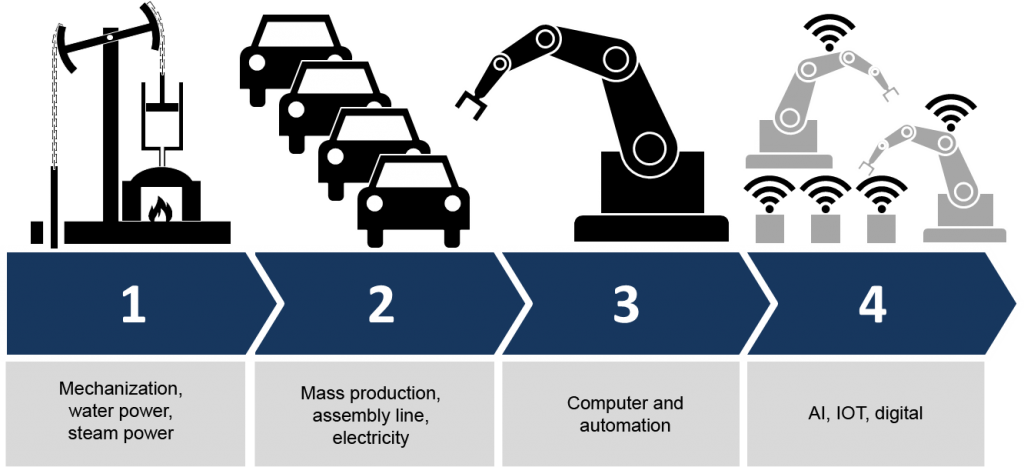“We stand on the brink of a technological revolution that will fundamentally alter the way we live, work, and relate to one another”, says Klaus Schwab, Founder and Executive Chairman of the World Economic Forum (WEF).
Innovation has been accelerating for the past 300 years, but with today’s pace of technological advances, Schwab says the speed of current breakthroughs has no historical precedent. We are now entering a 4th Industrial Revolution where when compared to previous industrial revolutions, we are evolving at an exponential rate rather than linear rate.
Schwab describes: “The First Industrial Revolution used water and steam power to mechanize production. The Second used electric power to create mass production. The Third used electronics and information technology to automate production. Now a Fourth Industrial Revolution is building on the Third, the digital revolution that has been occurring since the middle of the last century. It is characterized by a fusion of technologies that is blurring the lines between the physical, digital, and biological spheres.”
This change in technology is not just a continuation of the rise of the microchip, but rather forces and factors including AI and machine learning have accelerated the velocity and impact of change. We are entering a world where everyone will be globally connected by mobile devices, with mega processing power, storage capacity and access to all forms of knowledge. Breakthroughs in everything from IOT (Internet of Things where every device becomes connected and more intelligent through technology) to robotics, self-driving vehicles, 3D printing, nanotechnology, biotechnology, energy, storage, and quantum computing is the new and present age of industry.
No industry will be spared in this digital revolution. Today all forms of work are open for disruption and must face the every quickly changing environment to master competitive advantage.
Despite massive technological advances coming our way, the challenge with leadership remains. Great leaders are needed to drive innovation in the right direction and pave the way of the future.
The rate of technological change will continue to transform how people and companies operate, causing societal transformation perhaps even more profound previous industrial revolutions.
This presents both opportunity and risk to companies. On one hand, there are more opportunities than ever to apply new technology, AI, or augmented reality to transform business. On the other, the vast majority of businesses could struggle to keep up.
What can CEOs, owners, and investors do to make sure they are in a strong position going into this fourth industrial revolution? Collaboration is going to be one vital component, drawing on specific expertise to help a company evolve to a new and improved version of itself.
The good news is that more on-demand, project-based team members are on call today than ever before – and they are sharpening their skills rapidly. Whether Project-based CIOs who specialize in ERP and system implementation to Outsourced CMOs who can bring brand strategy expertise to Interim CFOs who focus on operational improvement, these executives drive transformation and change to ensure a company is on strong ground going into the future.
On-demand leadership often begins with a business assessment, a type of health check-up or audit for an organization to see what’s working, what isn’t, and to prioritize and set out a roadmap for the future.
“My art is a new technology product. It is something original and new even if there was something on the canvas before,” Dean Samuels, an Interim CIO who has worked to drive IT system implementations and technology transformation at many companies says. He goes on to explain that in companies that need reinvention, he specializes in seeing over the horizon to identify technologies that are emerging before anyone else can.
Companies that simply react to the new industrial revolution could be too late. The best, smart companies will be proactive, willing to take on fresh thinking, and even change.
Warren Buffet, Chairman and CEO of Berkshire Hathaway says it best: “Should you find yourself in a chronically leaking boat, energy devoted to changing vessels is more productive than energy devoted to patching leaks.”






